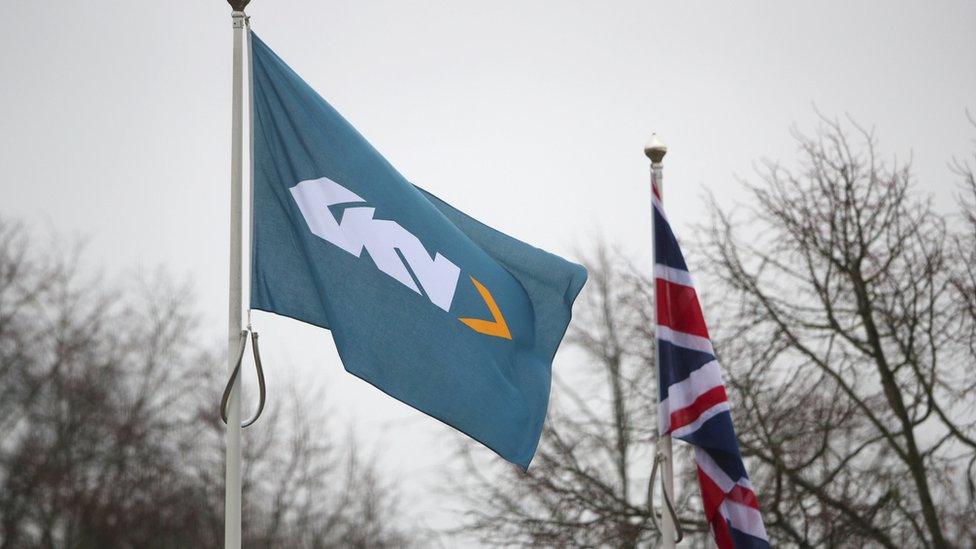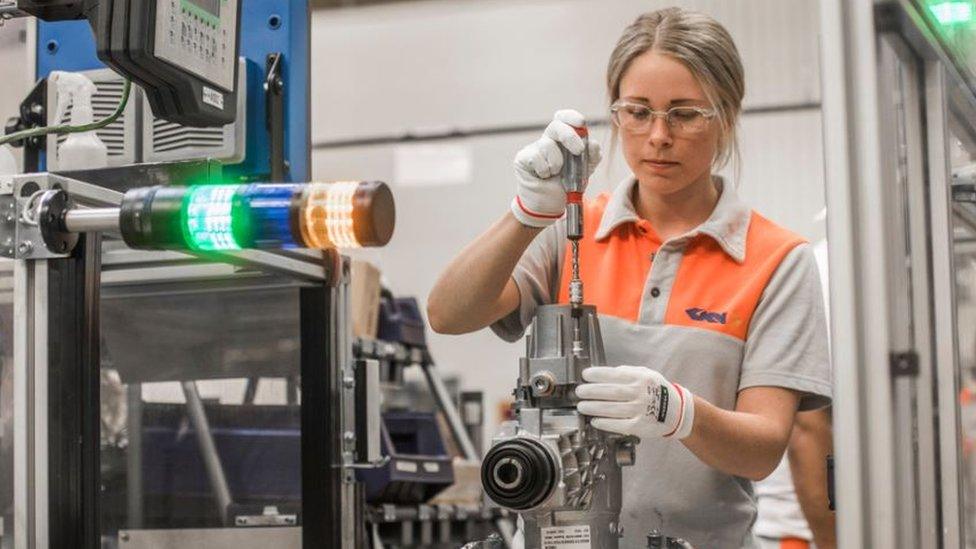Why the the GKN bid battle matters
- Published
- comments

Later we will find out whether the owner of a company with 260 years of engineering and innovation history will throw its lot in with a company that likes to run businesses for less than five.
Melrose's pursuit of GKN is the first hostile takeover bid to go the distance for nearly a decade and, as such, is an important litmus test of the brand of capitalism at work in the UK today.
As we contemplate the takeover of a venerable name with 60,000 employees by a smaller company that is much loved by the markets but mistrusted by unions and many politicians, the ghosts of Kraft, Cadbury, BHS and the smoke from the still smouldering wreck of Carillion hover in the mind.
These were all very different disasters but there are some common denominators which are at play in the Melrose-GKN tussle.
In all of them, there is a sense that the creation of value for shareholders meant the extraction of value for everyone else - like workers, suppliers and pension scheme members.
Lessons learned?
In the case of Kraft Cadbury it was closure of the Somerdale factory with the loss of 400 jobs days after it had completed the deal to buy the two hundred year old confectioner and something Kraft had expressly promised it wouldn't do.
In the case of BHS, it was years of under investment in a once-loved high street brand as hundreds of millions were paid out in rents and dividends to a flamboyant billionaire before he dumped it for a pound to a three-time bankrupt. 10,000 jobs were lost and politicians and the public cried foul.
Carillion was the UK's second biggest construction company until almost overnight it went into liquidation - not administration mind - there wasn't enough cash left to pay administrators to manage its decline.
The company's destruction was total and rapid - just eight months after executives and its auditors had given the company a clean bill of health. As the company's dire predicament was becoming clear, executives were manoeuvring to protect their bonuses according to the findings of a committee of MPs.
Contact sport

The co-chair of that committee, Labour MP Frank Field has popped up in almost all of these episodes. He campaigned to have Sir Philip Green stripped of his knighthood, described the behaviour of Carillion executives as "greed on stilts" and raised an alarm over the potential threat posed by Melrose to the GKN pension fund.
While he has been an effective high priest of moral outrage at corporate self interest - is it perhaps a bit naive to expect that there won't be a few casualties in a contact sport like free market economics?
Not all forms of the game are the same. The UK has in the past played a particularly fast and loose version where the law of the market jungle is skewed in favour of those with a short term objective.
As of today, nearly 25% of the shares are owned by investors who didn't have any interest in GKN three months ago. They are hedge funds who get involved because there is money to be made betting on the relative direction of the shares in both predator and prey as the takeover battle unfolds. The shareholders who will likely swing the vote have only been around for the blink of an eye.
A large proportion of the rest are held by index funds which have to own the shares because GKN is a member of the FTSE 100. So relatively few of the people that own it really have an active, engaged interest in the long term prospects and strategy of the company.
What shareholders want
Is this state of affairs inevitable in a free market? Not necessarily.
When Kraft Heinz launched one of the world's biggest takeover bids for Unilever last year, Unilever's chief executive Paul Polman could be found complaining that UK takeover rules pandered to the interests of shareholders over those of customers, workers, suppliers, innovation, communities and the environment.
The relevant section of UK law (section 172 of the Companies Act 2006) does say that directors have to consider these groups but the law is very clear that shareholders' interests are paramount.
What shareholders want, shareholders get. And in a takeover situation, many shareholders want more money now - and so the directors are obliged to deliver that by accepting a good takeover price.
In the Netherlands, those wider interests hold much more legal and cultural sway and so it's harder for a corporate raider to succeed. Mr Polman, a Dutchman, has been a very vocal campaigner for exactly this brand of sustainable capitalism. Unilever has since moved from a joint Anglo-Dutch structure to a plain Dutch one.
This Conservative government has sought to distance itself from its predecessors by disavowing the old Tory orthodoxy that the freewheeling Darwinism of the market is always right.
When she became leader, Theresa May warned big business that the government would step in where markets failed to produce an economic model that worked for everyone.
Following that script, Business Secretary Greg Clark staged a last minute intervention yesterday to show the government meant what it said and used rules forged from the painful lessons of Kraft Cadbury to demand assurances from Melrose on its future plans for GKN.
He extracted a few promises but not enough to stop a large cost cutting drive and the eventual disposal of GKN's divisions as it sees fit.
Radical surgery ahead
Many have argued, quite reasonably, that GKN has been poorly run for a long time. Its financial health has been neglected and to thrive it needs precisely the kind of kick up the backside that Melrose will deliver. Melrose executives have said they treat the businesses they buy "as if they were going to own them forever" and have as good a record of investing in good assets as disposing of bad ones.
But they don't own them forever and they will be looking to move on in a few years' time to a new target.
It is surely true that the managements of poorly run businesses should not be protected from the attentions of well run businesses and takeovers must be part of the corporate landscape. The complicating factor in this case is that the nature of GKN's business - which include long term defence contracts - is a mismatch with an owner with such a short term investment horizon.
That is certainly the view of former Defence Secretary Lord Heseltine, who intervened in several defence situations including Westland, Rolls Royce and BAE Systems.
He told the BBC "no other country would allow this to happen. The interests of the defence industry are long term, the interests of Melrose are to maximise profits over a very short period of time. Most defence contracts are joint ventures with foreign governments and foreign companies, a time horizon of five years is not even long enough to get something on the drawing board".
Whatever happens, GKN is in for radical surgery. The current management plans to sell its automotive division to a US company to raise money to return to shareholders - a plan it says was hatched before the noisy upstart Melrose arrived on the scene.
One big shareholder of GKN told the BBC it thought the company was selling it too cheap and described it as "a reactive fire sale to the Melrose approach to pacify GKN's long suffering shareholders."
Once again, the masters of the universe, and of GKN's destiny, are the asset managers. Larry Fink, the boss of the world's biggest investor, Blackrock, has nobly said more than once that companies are too focused on short-term results and not enough on creating long-term value.
His firm is the largest shareholder in GKN so it will be interesting to discover whether or not it backs Melrose - the kings of the short-term turnaround.
- Published27 March 2018
- Published27 March 2018

- Published15 March 2018

- Published21 March 2018
